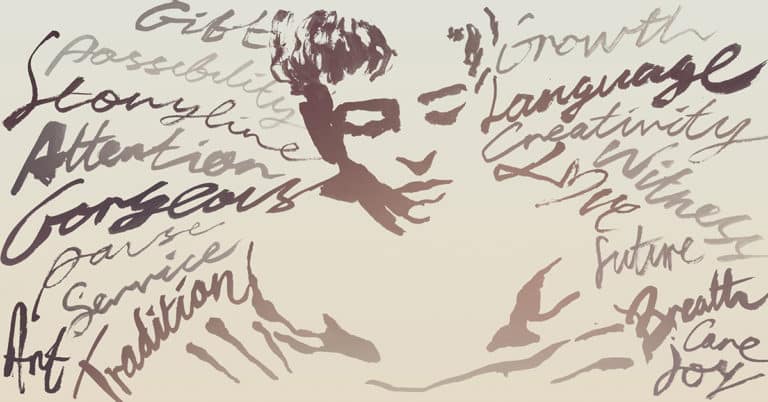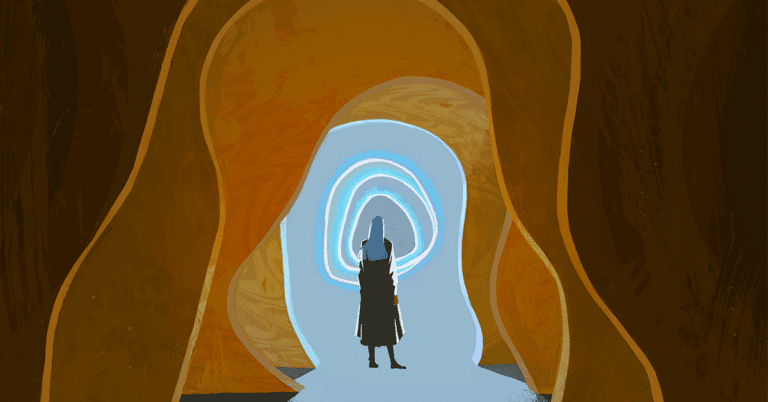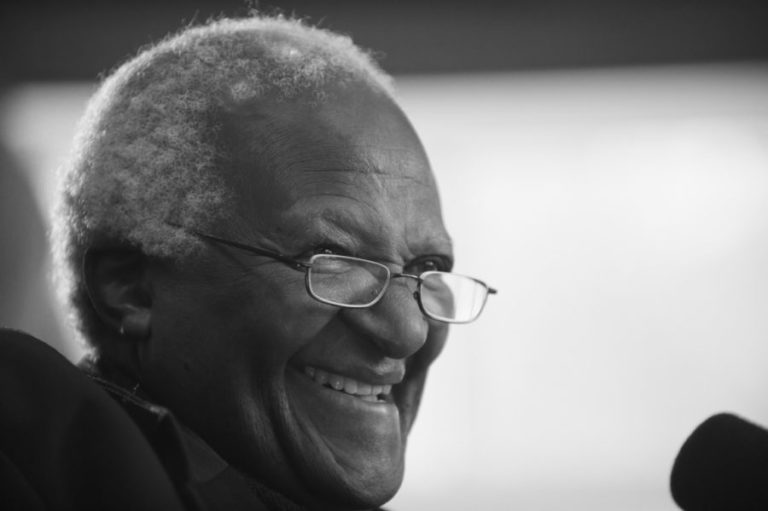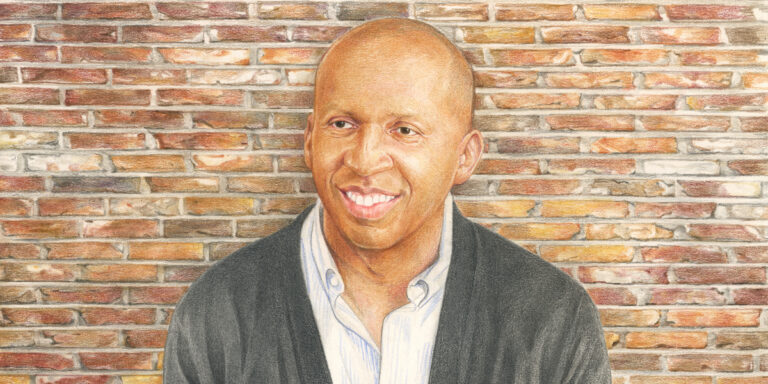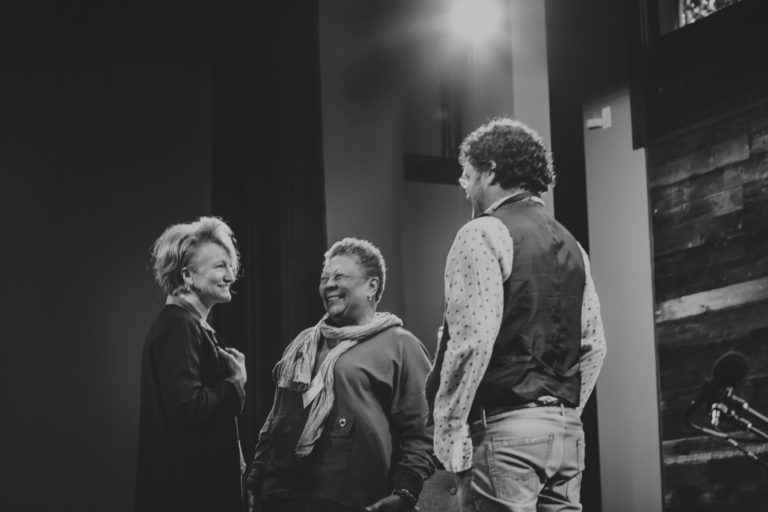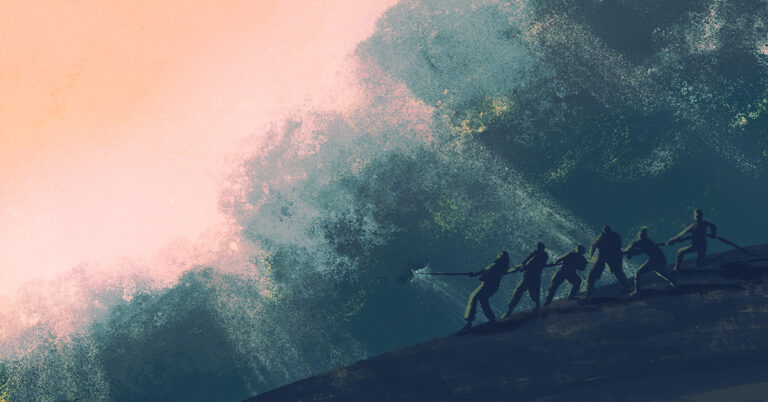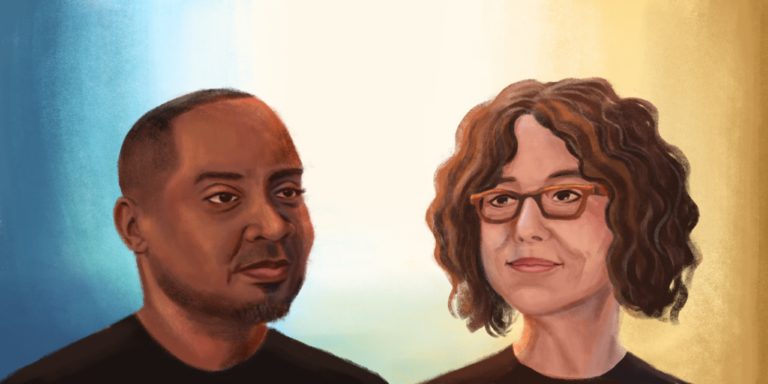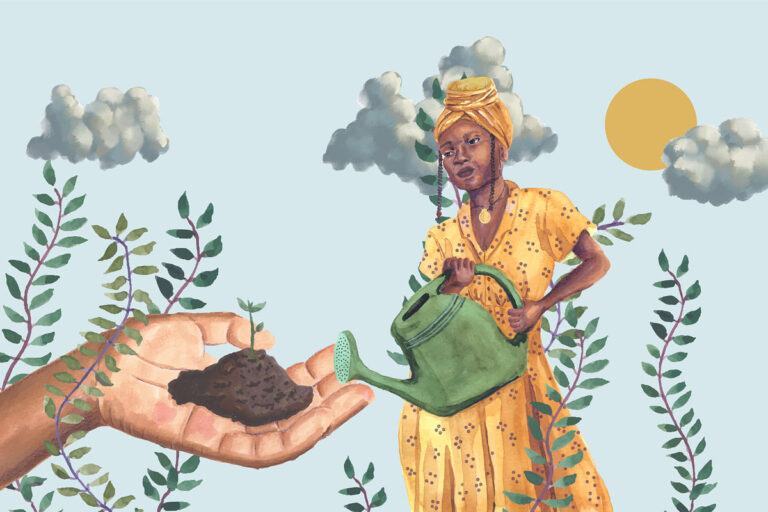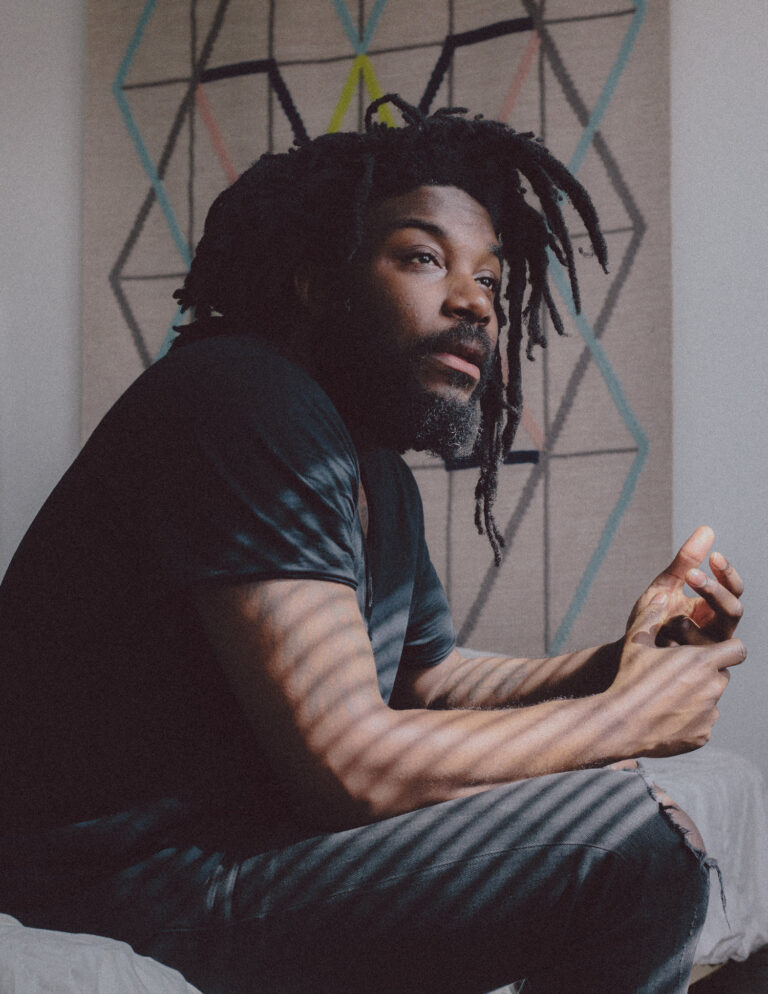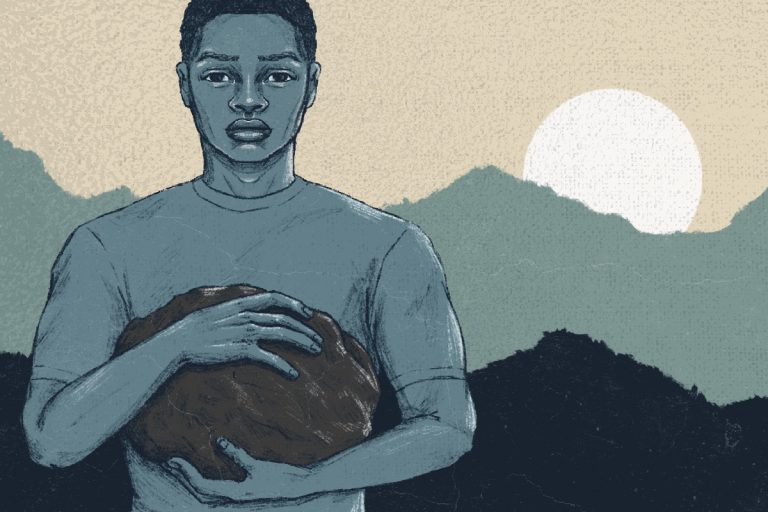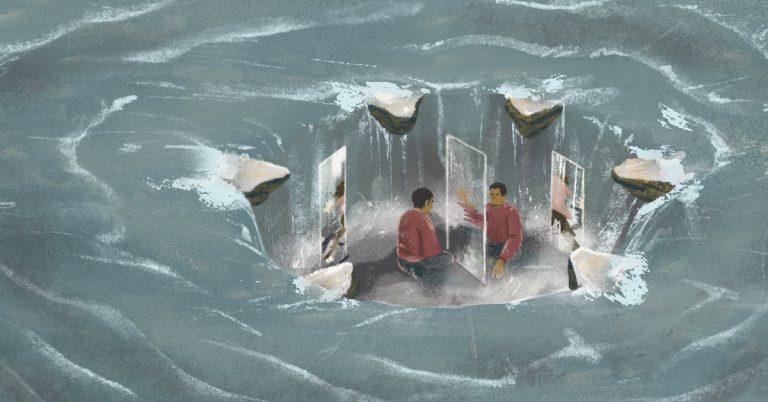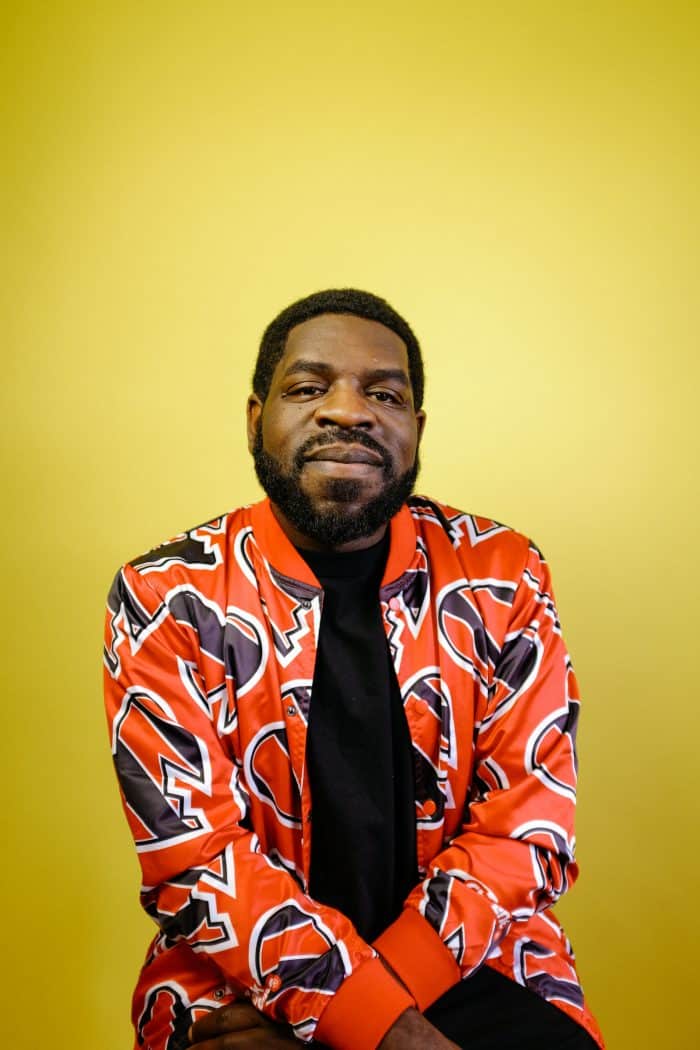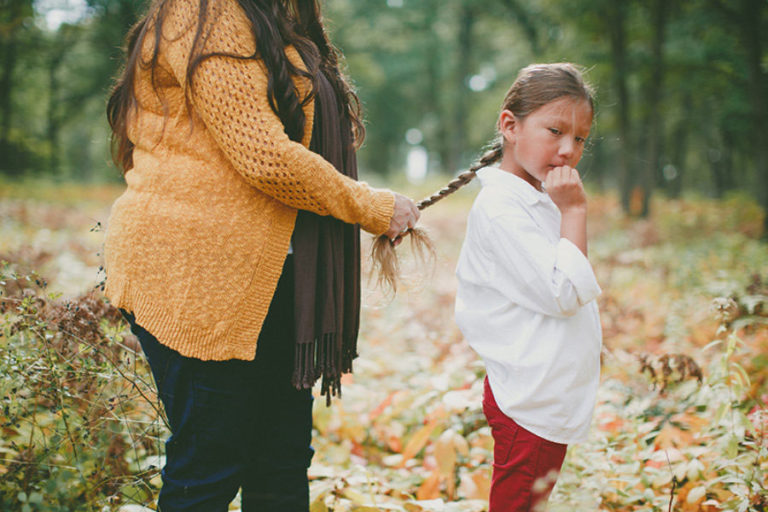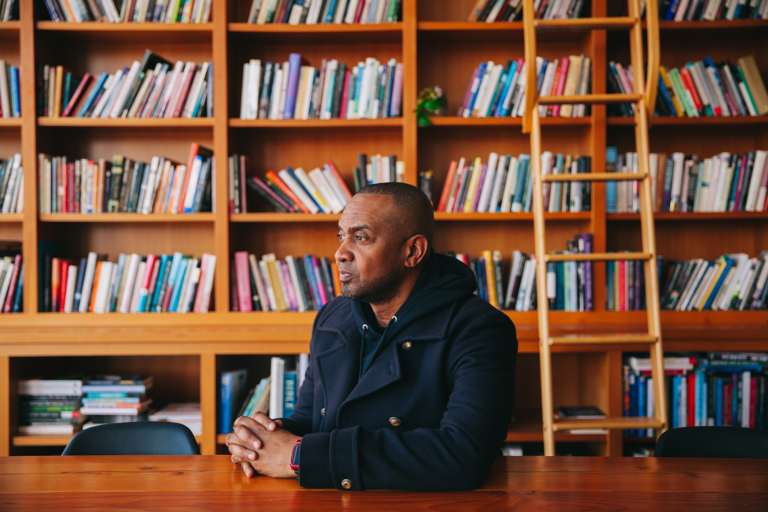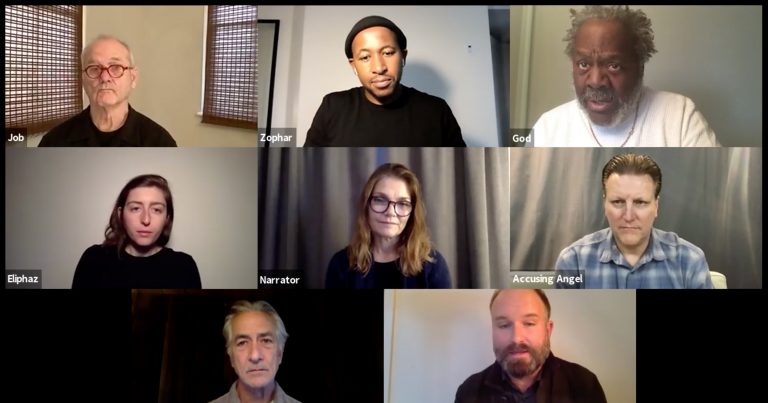There is an ecological transformation unfolding in the places we love and come from. On a front edge of this reality, which will affect us all, Colette Pichon Battle is a singular model of brilliance and graciousness of mind and spirit and action. And to be with her is to open to the way the stories we tell have blunted us to the courage we’re called to, and the joy we must nurture, as life force and fuel for the work ahead. As a young woman, she left her home state of Louisiana and land to which her family belonged for generations, to go to college and become a powerful lawyer in Washington, D.C. Then in 2005, after Hurricane Katrina made, as she has said, “a crack in the universe,” she returned home to a whole new life and calling. Colette Pichon Battle is a vivid embodiment of the new forms societal shift is taking in our world — led by visionary pragmatists close to the ground, in particular places, persistently and lovingly learning and leading the way for us all.
Civil Conversations Project
On Being episodes in The Civil Conversations Project.
Latest
View
- List View
- Standard View
- Grid View
93 Results
There is an ecological transformation unfolding in the places we love and come from. On a front edge of this reality, which will affect us all, Colette Pichon Battle is a singular model of brilliance and graciousness of mind and spirit and action. And to be with her is to open to the way the stories we tell have blunted us to the courage we’re called to, and the joy we must nurture, as life force and fuel for the work ahead. As a young woman, she left her home state of Louisiana and land to which her family belonged for generations, to go to college and become a powerful lawyer in Washington, D.C. Then in 2005, after Hurricane Katrina made, as she has said, “a crack in the universe,” she returned home to a whole new life and calling. Colette Pichon Battle is a vivid embodiment of the new forms societal shift is taking in our world — led by visionary pragmatists close to the ground, in particular places, persistently and lovingly learning and leading the way for us all.
May 3, 2023
Ocean Vuong
A Life Worthy of Our Breath
Krista interviewed the wise and wonderful writer Ocean Vuong on March 8, 2020 in a joyful, crowded room full of podcasters in Brooklyn. A state of emergency had just been declared in New York around a new virus. But no one guessed that within a handful of days such an event would become unimaginable. Most stunning is how presciently, exquisitely Ocean speaks to the world we have come to inhabit— its heartbreak and its poetry, its possibilities for loss and for finding new life.
“I want to love more than death can harm. And I want to tell you this often: That despite being so human and so terrified, here, standing on this unfinished staircase to nowhere and everywhere, surrounded by the cold and starless night — we can live. And we will.”
April 28, 2022
Pádraig Ó Tuama
“This fantastic argument of being alive”
Pádraig Ó Tuama is a friend, teacher, and colleague to the work of On Being. But before that was true, Krista took a revelatory trip to meet him at his home in Northern Ireland, a place that has known sectarianism and violent fracture and has evolved, not to perfection, yet to new life and once unimaginable repair and relationship. Our whole world screams of fracture, more now than when Krista sat with Pádraig in 2016. This conversation is a gentle, welcoming landing for pondering and befriending hard realities we are given. As the global educator Karen Murphy, another friend of On Being and of Pádraig, once said to Krista: “Let’s have the humility and the generosity to step back and learn from these places that have had the courage to look at themselves and look at where they’ve been and try to forge a new path with something that resembles ‘together’ … Right now we should be taking these stories and these examples and these places and filling our pockets and our lungs and our hearts and our minds with them and learning deeply.” And that’s what this hour with Pádraig invites.
February 17, 2022
Sharon Salzberg and Robert Thurman
Love Your Enemies? (Really?)
It’s a piece of deep psychological acuity, carried in many religious traditions: that each of us is defined as much by who our enemies are and how we treat them as by whom and what we love. In this episode, two legendary Buddhist teachers shine a light on the lofty ideal of loving your enemies and bring it down to earth. Across a half-century conversation and friendship, Sharon Salzberg and Robert Thurman have investigated the mind science behind this virtue and practice. They illuminate how to transmute the very real, very consequential and consuming energy of anger and hatred — and why love in fact can be a rational and pragmatic stance towards those who vex us. This is a conversation filled with laughter and friendship and with practical wisdom on how we relate to that which makes us feel embattled from without, and from within.
January 6, 2022
Remembering Desmond Tutu
The remarkable Archbishop Emeritus of Cape Town and Nobel Laureate died in the closing days of 2021. He helped galvanize South Africa’s improbably peaceful transition from apartheid to democracy. He was a leader in the religious drama that transfigured South African Christianity. And he continued to engage conflict well into his retirement, in his own country and in the global Anglican communion. Krista explored all of these things with him in this warm, soaring 2010 conversation — and how Desmond Tutu’s understanding of God and humanity unfolded through the history he helped to shape.
November 4, 2021
Bryan Stevenson
Finding the Courage for What's Redemptive
How to embrace what’s right and corrective, redemptive and restorative — and an insistence that each of us is more than the worst thing we’ve done — these are gifts Bryan Stevenson offers with his life. He’s brought the language of mercy and redemption into American culture in recent years, growing out of his work as a lawyer with the Equal Justice Initiative based in Montgomery, Alabama. Now the groundbreaking museum they created in Montgomery has dramatically expanded — a new way of engaging the full and ongoing legacy of slavery in U.S. history. Krista draws out his spirit — and his moral imagination.
October 28, 2021
Pádraig Ó Tuama and Marilyn Nelson
“So let us pick up the stones over which we stumble, friends, and build altars”
Where to turn to find my place of standing when it feels like the world is on fire? This question surfaced in a public conversation Krista had just a couple of years ago with Pádraig Ó Tuama and Marilyn Nelson, two poet-contemplatives. Pádraig weaves together social healing, poetry, and theology. Marilyn is a lyrical excavator of stories that would rather stay hidden — yet as she coaxes them into the light, they lead to new life. This conversation is a pleasure and balm, and a reminder that the ruptures and unease and reckonings of what we call “this moment” were all before us before the pandemic. Pádraig and Marilyn’s offerings are beyond wise, and distinctly tender and powerful for this now.
October 21, 2021
Katharine Hayhoe
“Our future is still in our hands”
Katharine Hayhoe is one of the most esteemed atmospheric scientists in the world. She’s made her mark by connecting dots between climate systems and weather patterns and the lived experience of human beings in their neighborhoods and communities. She’s also an ambassador, if you will, between the science of climate change and the world of evangelical Christian faith and practice, which she also inhabits. To delve into that with her is to learn a great deal that refreshingly complicates the picture of what is possible and what is already happening, even across what feel like cultural fault lines. If you want to speak and walk differently on this frontier, this is a conversation for you.
September 30, 2021
Priya Parker
Remaking Gathering: Entering the Mess, Crossing the Thresholds
Priya Parker has become the voice of what it means to gather in this world we inhabit now. She is helping remake the “how” of coming together — and more importantly, the “why.” Long before the pandemic, she points out, we had fallen into rote forms for staff meetings, birthday parties, conferences, shared meals. Virtual or physical, this time of regathering offers a threshold we can decide to cross with imagination, purpose, and joy. This is a conversation with so much to walk away from and put immediately into practice.
August 19, 2021
Robin DiAngelo and Resmaa Menakem
Towards a Framework for Repair
Through the ruptures of the past year and more, we’ve been given so much to learn, and callings to live differently. But how to do that, and where to begin? Resmaa Menakem’s book, My Grandmother’s Hands, and his original insights into racialized trauma in all kinds of bodies, have offered new ways forward for us all. So we said yes when Resmaa proposed that he join On Being together with Robin DiAngelo. She has been a foremost white voice in our civilizational grappling with whiteness. This conversation is not comfortable, but it is electric and it opens possibility.
July 29, 2021
Jen Bailey
What We Inherit & What We Send Forth
“I’m entering into this next phase… with a great deal of curiosity and perhaps tenderness, wanting to hold each other tight, because I think that there are ramifications of last year that have yet to be felt.” Rev. Jen Bailey is a wise young pastor and social innovator, and a “friend of a different generation” of Krista. This conversation is a loving adventure in cross-generational mapmaking and care. Jen is a leader in a widening movement that is “healing the healers” — sustaining individuals, organizers, and communities for the long, life-giving transformations ahead.
This conversation came about in partnership with Encore.org.
July 1, 2021
Jason Reynolds
Imagination and Fortitude
Jason Reynolds is the National Ambassador for Young People’s Literature of the Library of Congress — and a magnificent source of wisdom for human society as a whole. He’s driven by compassion and the clear-eyed honesty that the young both possess and demand of the rest of us. Ibram X. Kendi chose him to write the YA companion to Stamped from the Beginning. In his person, Jason Reynolds both embodies and inspires innate human powers of fortitude and imagination. Hear him on “breathlaughter”; the libraries in all of our heads; and a stunning working definition of anti-racism: “simply the muscle that says humans are human… I love you, because you remind me more of myself than not.”
May 27, 2021
Tracy K. Smith and Michael Kleber-Diggs
‘History is upon us... its hand against our back.’
The pandemic memoirs began almost immediately, and now comes another kind of offering — a searching look at the meaning of the racial catharsis to which the pandemic in some sense gave birth and voice and life. Tracy K. Smith co-edited the stunning book, There’s a Revolution Outside, My Love: Letters from a Crisis, a collection of 40 pieces that span an array of BIPOC voices from Edwidge Danticat to Reginald Dwayne Betts, from Layli Long Soldier to Ross Gay to Julia Alvarez. Tracy and Michael Kleber-Diggs, who also contributed an essay, join Krista for a conversation that is quiet and fierce and wise. They reflect inward and outward, backwards and forwards, from inside the Black experience of this pivotal time to be alive.
The classic economic theory embedded in western democracies holds an assumption that human beings will almost always behave rationally in the end and make logical choices that will keep our society balanced on the whole. Daniel Kahneman is the psychologist who won the Nobel Prize in Economics for showing that this is simply not true. There’s something sobering — but also helpfully grounding — in speaking with this brilliant and humane scholar who explains why none of us is an equation that computes. As surely as we breathe, we will contradict ourselves and confound each other.
April 29, 2021
Hanif Abdurraqib
Moments of Shared Witnessing
Hanif Abdurraqib’s writing is filled with lyricism, rhythm, people and precision. In his essays and poetry, he introduces readers to a soundscape of Black performance and Black joy: we hear hip-hop and jazz, we hear Nina Simone, Aretha Franklin and Little Richard. Music and performance of every kind are the source of his fascination, focus and wisdom: what makes people cry, or feel safe, or brave; held in struggle, joy, or love. Hanif is interviewed by our colleague, Pádraig Ó Tuama, a poet himself and the host of On Being Studios’ Poetry Unbound podcast, now in its third season.
April 22, 2021
Layli Long Soldier
The Freedom of Real Apologies
Layli Long Soldier is a writer, a mother, a citizen of the United States, and a citizen of the Oglala Lakota Nation. She has a way of opening up this part of her life, and of American life, to inspire self-searching and tenderness. Her award-winning first book of poetry, WHEREAS, is a response to the U.S. government’s official apology to Native peoples in 2009, which was done so quietly, with no ceremony, that it was practically a secret. Layli Long Soldier offers entry points for us all — to events that are not merely about the past, and to the freedom real apologies might bring.
April 15, 2021
Resmaa Menakem
“Notice the Rage; Notice the Silence”
Across the past year, and now as the murder trial of Derek Chauvin unfolds with Minneapolis in fresh pain and turmoil, we return again to the grounding insights of Resmaa Menakem. He is a Minneapolis-based therapist and trauma specialist who activates the wisdom of elders, and very new science, about how all of us carry in our bodies the history and traumas behind everything we collapse into the word “race.” We offer up his intelligence on changing ourselves at a cellular level — practices towards the transformed reality most of us long to inhabit.
April 8, 2021
Bryan Doerries
“You are not alone across time.”
“Remember,” Bryan Doerries likes to say in both physical and virtual gatherings, “you are not alone in this room — and you are not alone across time.” With his public health project, Theater of War, he is activating an old alchemy for our young century. Ancient stories, and texts that have stood the test of time, can be portals to honest and dignified grappling with present wounds and longings and callings that we aren’t able to muster in our official places now. It’s an embodiment of the good Greek word catharsis — releasing both insight and emotions that have had no place to go, and creating an energizing relief. And it is now unfolding in the “amphitheater” of Zoom that Sophocles could not have imagined.
The Pause
Join our constellation of listening and living.
The Pause is a monthly Saturday morning companion to all things On Being, with heads-up on new episodes, special offerings, event invitations, recommendations, and reflections from Krista all year round.
Search results for “”
View
- List View
- Standard View
- Grid View
Filters

